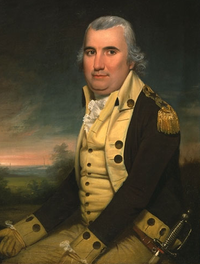Charles Cotesworth Pinckney, also of South Carolina, was a cousin of Charles Pinckney. Madison distinguished them by referring to him as "General Pinckney." When Randolph first proposed the Virginia Plan, General Pinckney questioned whether the convention had the authority to propose an entire new system and seconded a motion that instead of calling for a "national" government simply called for a "more effective" government "to carry into execution the Design of the States." He wanted to leave "a considerable share of power in the States," and proposed to have the state legislatures elect the national legislature, saying the states would be jealous and try to thwart the national government unless given participation in it.
On the nationalist side, he appears to have opposed giving each state equal representation in the Senate, saying that giving the House sole authority to originate money bills was not significant concession, although he also opposed disbanding the Convention over the issue. His most nationalist position was to favor federal federal regulation of the militia. Speaking from experience in the Revolutionary War, General Pinckney said that uniformity was essential, and that states could not be counted upon to maintain proper discipline. Furthermore, he saw no reason to distrust the general government on this issue at least, and favored federal control of the entire militia.
On the other hand, he wanted each state to be allowed to decide which ports would be ports of entry (ports involved in foreign trade), and wished to allow national representatives to hold state office, in order to increase state influence in the federal government.
John Rutledge (South Carolina):
John Rutledge did not like the vague proposal in the original Virginia Plan to give the federal government power in all area for which the states were "incompetent." He preferred a more specific designation of what those powers should be. He did, however, believe that the federal Congress would have enough business to require it to meet every year.
Like the rest of the South Carolina delegation, Rutledge opposed equal representation in the Senate. Instead, he proposed giving each state one, two, or three delegates, depending on their "relative importance." He apparently favored making representation of all states in both houses proportionate to their tax quotas. When the convention reached its ultimate deadlock on Senate representation, he somewhat ambiguously said:
[He] could see no need of an adjournt. because he could see nochance of a compromise. The little States were fixt. They had repeatedly & solemnly declared themselves to be so. All that the large States then had to do, was to decide whether they would yield or not. For his part he conceived that altho' we could not do what we thought best, in itself, we ought to do something.This appears to be a grudging agreement to the Great Compromise. Rutledge did not favor giving the federal government power to establish trial courts or regulate elections.


No comments:
Post a Comment